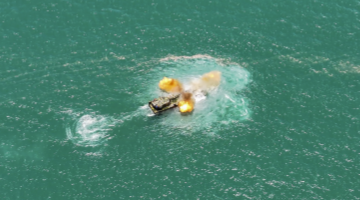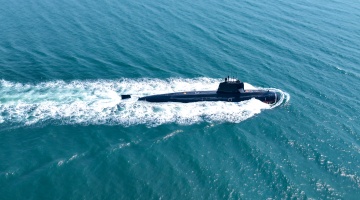On the evening of June 21, US President Donald Trump confirmed that the US military had completed attacks on three nuclear sites in Iran. Regional affairs experts pointed out that the US military's direct involvement in the Israel-Iran conflict marks a dangerous escalation that significantly raises the risk of further conflict and regional spillover. The move has pushed the relevant countries and the broader Middle East to the brink of disaster, with the potential for a chain reaction that could reverberate across the globe.
On June 22, Iranian officials confirmed that the nuclear facilities in Fordow, Natanz, and Esfahan had been attacked.
According to The New York Times, President Trump's order to strike Iran's nuclear facilities amounted to a huge gamble, betting that the US could withstand Iran's subsequent retaliation against more than 40,000 American troops stationed in the region and that the strikes would definitively halt Iran's ability to restart its nuclear programme. It would be a dangerous gamble.
This huge gamble of the Trump administration has drawn criticism both from within the US and even from members of the Republicans. House Minority Leader and Democrat Hakeem Jeffries stated that the administration had launched military strikes without seeking congressional authorization and placed the US at risk of being dragged into a catastrophic war in the Middle East.
On June 22, Iranian Foreign Minister Seyed Abbas Araghchi stated on social media that the US strikes on Iran's nuclear facilities were "outrageous" and would have "lasting consequences." He stressed that Iran reserves all options to defend its sovereignty, national interests, and people. Multiple international media outlets and experts believe that the US military operation will further heighten tensions, increase the risk of conflict spillover, and bring prolonged turmoil to the entire region.
Many regional analysts have pointed out that the chain reaction triggered by the US airstrikes on Iran could spread globally. Even the US, which is currently striving to rein in inflation, may end up suffering the consequences of its own actions. Should the conflict escalate to the point where the Strait of Hormuz is blocked, it would cripple global energy supplies, triggering shockwaves that ripple through the world economy.
In addition, Gulf countries are particularly concerned that a further escalation could trigger a nuclear leak. A nuclear leak, if it were to occur, could result in long-term radioactive contamination, posing an ecological, public health, and humanitarian disaster with consequences that may persist for decades.
Experts and scholars from multiple countries have warned that the US airstrikes on Iran risk may open "the Pandora's box" of escalating violence. They stressed that the use of force is not the right approach to resolving international disputes and that the Iranian nuclear issue must be brought back onto the path of political dialogue and negotiation.
On June 22, the Atomic Energy Organization of Iran issued a statement declaring that Iran has no intention of halting the development of its nuclear industry following the attacks on its nuclear facilities. Experts have pointed out that the US airstrikes will only further complicate the Iranian nuclear issue rather than resolve it. Iran is unlikely to abandon its nuclear programme easily and the attack by US may even strengthen its determination to pursue nuclear weapons.
The response of Iran may not be limited to the military domain. Tehran could consider withdrawing from the Treaty on the Non-Proliferation of Nuclear Weapons (NPT). A nuclear policy expert from the US think tank Arms Control Association noted that while the US may be able to destroy Iran's nuclear facilities, it cannot erase the technical knowledge Iran has already acquired. Instead of deterring Iran, the military strikes may further incentivize its pursuit of nuclear weapons. Therefore, the US still needs a de-escalation plan and a long-term strategy to prevent nuclear proliferation. Analysts have called for the resumption of dialogue and negotiations as the only viable solution. They stressed that the Iranian nuclear issue must be brought back onto the track of political settlement through dialogue and consultation.













